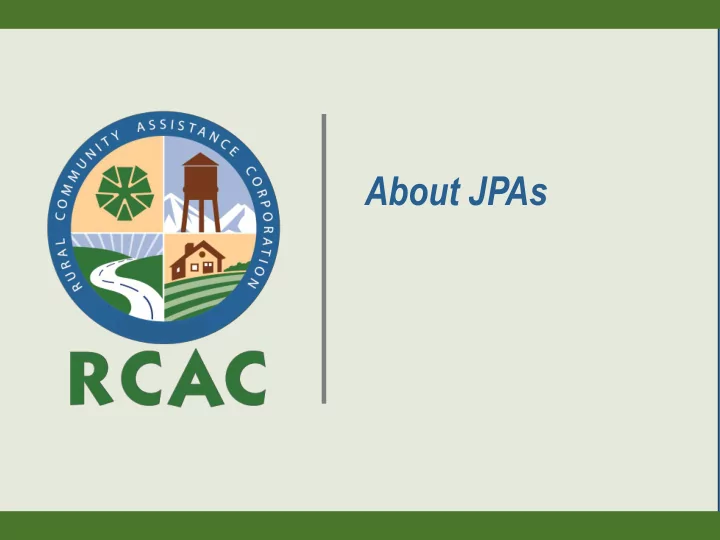

About JPAs
What are JPAs • Some JPAs are cooperative arrangements among existing agencies, • A JPA could be a new, separate institution called joint powers agency
JPA An acronym used for three different terms: • Joint powers agreement. • Joint powers agency. • Joint powers authority.
Statutory Authority of JPAs • Governments get their authority to work together from a state law called the Joint Exercise of Powers Act.1 • JPAs can exercise only those powers that are common to their member agencies.
Why Form a JPA JPAs exist for many reasons: sharing resources, combining services, the member agencies and their taxpayers save time and money Agencies create JPAs to deliver more cost ‐ effective services, eliminate duplicative efforts, and consolidate services into a single agency.
A joint powers agreement - JPA A member agency agrees to be responsible • This agency delivers services on behalf of the other member agencies. • This agency will administer the terms of the agreement, which may be a short ‐ term, long ‐ term, or perpetual ‐ service agreement.
The formation of a JPA Begins when • public officials negotiate a formal agreement that spells out the member agencies ’ intentions, the powers they will share, and other mutually acceptable conditions that define the intergovernmental arrangement. • each member agency’s governing body approves the joint powers agreement.
An Alternative Way • To exercise joint powers several agencies may create a new organization that is completely separate from the member agencies. • This organization is known as a joint powers agency or joint powers authority.
To create a Joint Powers Agency • If a joint powers agreement creates a new joint powers agency, the JPA must file a Notice of a Joint Powers Agreement with the Secretary of State • Until public officials file those documents, a JPA cannot incur any debts, liabilities, or obligations, or exercise any of its powers.
A Joint Powers Agency or Joint Powers Authority • A new, separate government organization created by the member agencies, • Legally independent from them. • Shares powers already common to the member agencies, and those powers are outlined in the JPA
How does the agreement looks like The agreement that creates a new joint powers agency: • describes the size, structure, and membership of the JPA’s governing board, • documents the JPA’s powers and functions. As a legally separate public agency, the JPA can sue or be sued, hire staff, obtain financing to build public facilities, and manage property.
Board Composition & Powers • This new agency typically has officials from the member agencies on its governing board. • This JPA may have the same responsibilities as any public agency, including personnel, budgeting, operations, and maintenance.
JPAs must follow state laws: • Brown Act -meetings are open to the public. • Public Records Act,
Should we have JPA in our name? • When public officials create a joint powers agency, the new organization may not necessarily include “joint powers” or “JPA” in its name. • Yet, if a public organization relies on a joint powers agreement, the organization is a JPA, regardless of its title.
Found in JPAs’ official names are: • · agency · alliance · association · authority · board · bureau · coalition · commission · committee · consortium · cooperative · council · district · facility · fund · group · institute · JPA · • league · network · organization · partnership · plan · program · project • · region· service · services · source • · study · system · trust
Questions?
Recommend
More recommend